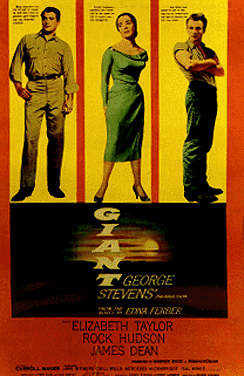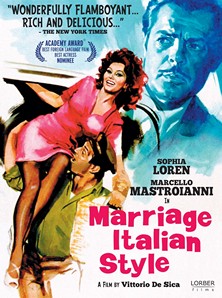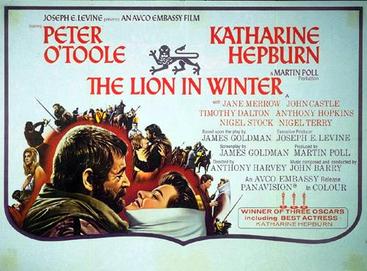Like so much of our current fiction, postmodern angst and bleakness has leached the meaning and joy out of a night at the movies or the theatre. But in the midst of the drek, there’s still a few good movies and plays, even if one has to go back to the archives to find the gold. As the cold and dark settled in for its winter run, my husband and I settled into our snug den to be entertained by:
- Giant
- Marriage Italian Style
- The Lion in Winter
- Present Laughter
Giant
- filmed in 1956
- starring Rock Hudson, Elizabeth Taylor, James Dean

This epic Western drama, based on Edna Ferber’s novel, sweeps the viewer into this family saga from the first frame of Jordan’s first sight of Leslie—he traveling on the train and she galloping alongside on the black stallion. Beauty saturates: the man, the woman, the horse, the countryside. Rock Hudson and Elizabeth Taylor inhabit their parts—Jordan ‘Bick’ Benedict, the Texas rancher, and Leslie Lynnton, his southern gentry wife—and are believable in their portrayal of a couple in love through all the ups and downs of married life. Including a time apart when differing points of view rend the fabric of their union. But they mend the tear and weave a stronger marriage cloth.
That is one of the most satisfying aspects of this movie: a couple that loves and likes each other, and fights to stay together; a couple that builds a family throughout the years, growing old together with children and grandchildren added as the years go by; a couple that creates happiness out of a daily life of decency.
The story starts in the early 1920s and takes us through to the early 1950s, Jordan and Leslie growing old along the way and the children growing up and becoming parents themselves. We watch as Reata, Jordan’s vast ranch, transforms from a sea of cattle to a sea of oilrigs. We watch as Jett Rink, played by James Dean in his last—and best role—before his death in a car accident, transforms himself from Reata’s scruffy handyman into a multimillionaire oilman, but with his obsession with Leslie and jealousy of Jordan still intact. We watch the endemic racism of Jordan and his fellow ranchers discriminate against Mexican Americans, pitted against Leslie’s push for better housing and healthcare of their Mexican American workers. We watch Leslie challenge the patriarchal social order and strive to prove she is much more than a beautiful face. And we watch them both grow into better—still flawed, but better—human beings.
One of the most moving scenes is the funeral of Angel Obregon II (played by Sal Mineo), the child of a Mexican American ranch worker who had been killed in the second world war. In a profound way, Angel was heir to Jordan’s love of ranching, much moreso than his son Jordy, and that tie was manifest as Angel was buried with military honours.
The final scene brings us back to the intimacy of the family after the tumult of a raucous Texan celebration and a fight in a diner. Leslie’s declaration of love and admiration for Jordan in his defence of Mexican Americans’ right to eat in the diner and Jordan’s love and exasperation at her reaction is the perfect coda to the Benedict family saga.
Marriage Italian Style
- filmed in 1964
- starring Marcello Mastroanni, Sophia Loren
Again, we have beautiful people—Marcello Mastroanni and Sophia Loren—but their relationship is in dramatic contrast to the Benedicts’. He’s a rich playboy; she’s a working girl. Filumena works in a Neapolitan brothel in the age-old profession that young, desperately poor, uneducated girls have been doing forever.
And she is naïve. She truly believes Domenico loves her as he comes and goes at the brothel over the years—dressing her up and taking her on excursions just like a real girlfriend. When he takes her to meet his mother, Filumena is overjoyed. Don’t we all know meeting one’s mother is the real test of a boy’s devotion? Well, Domi installs Filumena in his house as the caregiver of his senile, demanding mother, and his mistress on the side as he continues to travel and play as he pleases.
Poor Filumena! But her naivety gradually turns to wisdom, and she fakes death to force Domi to marry him ‘on her deathbed’. To his furious response to this charade, she tells him the reason for her ruse: to support her three sons, one of whom is his. But she will not tell him which one.
Love conquers all in the end—love Italian style that puts mother love above all others. And it’s that same mother love that leads to enduring romantic love between Filumena and Domi. Domi is deeply smitten, but a little bewildered by this whirlwind romance over 20 tumultuous years.

It’s a delightful movie and as quintessentially Italian as Giant is American.
The Lion in Winter
- filmed in 1968
- starring Peter O’Toole, Katherine Hepburn
Another movie, another marriage—this one our all-time favourite because it captures the good, the bad and the ugly of the passion between a man and a woman. And Peter O’Toole and Katherine Hepburn are masterful in portraying this relationship in all its love and savagery.

The story is a historical drama about the struggle for power in the Angevin Empire of medieval France. King Henry II has released his estranged wife, Eleanor of Aquitaine, from her island prison for the Christmas holidays. The time is 1183 and the place is Henry’s chateau in Chinon (in France’s Loire Valley). Henry and Eleanor greet each other exuberantly, and it’s all up hill and down dale from then on in.
Henry wants their youngest son, John, to inherit his throne; Eleanor wants
their oldest surviving son, Richard the Lionheart, to be the king; Philip II of France, the son and successor of Eleanor’s ex-husband, Louis VII of France, wants his sister Alais, who is Henry’s current mistress, to marry the future heir or return the dowry. And Alais is a lovely young woman, loved by Henry and liked by Eleanor, but neither value her as highly as their ambition for the throne to go to one whose blood commingles theirs.
The bargaining begins: Henry and Eleanor are beautiful, brilliant and ruthless; their three sons—Richard, Geoffrey and John—are loutish, cunning and cowardly; the pace is swift and the dialogue sparkles with the priceless gems of Eleanor’s “All families have their ups and downs” after a monumental fight with Henry, and Henry’s “the royal boys are aging with the royal port” after he has locked them in the wine cellar and threatened to throw away the key.
The battle royal ends in a draw, with Henry escorting Eleanor back to her barge to return to prison. But both are buoyant with hope for the future—and the joy and challenge of future marital battles. And the viewer is left with the lasting wonder about how truly deep a marriage bond between equals can be.
Present Laughter
- completed in 1939, first produced in 1942, regularly revived since
- starring Kevin Kline in the Broadway production, April 2017
Now for English by Noel Coward—a rambunctious, bubbling barrage of the language that makes one laugh and gasp and cry out with delight!
Garry Essendine’s success as a light comedy actor has subsumed him into a vain, strutting peacock of a man whose life revolves around he, himself and him. The play takes place over three days in his London flat as he prepares to depart for a touring engagement in Africa. Naturally, complication upon complication besets Garry: A young woman mistakes a one-night stand for a commitment of true love; his loyal secretary and estranged wife try to rescue him from his character flaws; his appointment with a young playwright turns crazy; and his partners lie both to him and
themselves. Amidst it all, Garry is having a mid-life crisis, precipitated by his recent 40th birthday.
There is little laughter is the present predicament for Garry, but there is abundant laughter for the audience. As we watch their antics and listen to their banter, our ears ache from keeping up with the conversations, spoken at full speed and in splendid English, while our sides ache with laughter.
The characters are exaggerated for effect, but they are human in their sincere concern for one another and in their scheming to be blameless while blaming all others.
If you love words and the sheer joy of a verbal joust, you’ll love the play.

